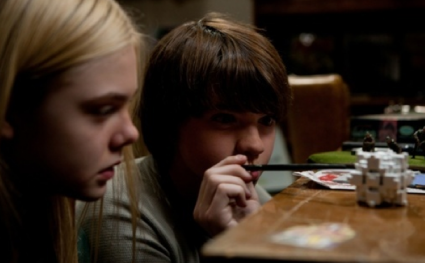

I walked in to Super 8 without really knowing what to expect. The story had been shrouded in mystery ever since rumors of a J.J. Abrams/Steven Spielberg collaboration started making their rounds through the Internets. The great by product of this particular situation is that no expectations means a fairly clear palate with which to actually enjoy a film, instead of invariably comparing it to whatever it was that you’ve created in your mind. I walked out with I think the exact feeling I was supposed to have: feeling like a kid again.
Fellow Clacker Chuck has already shared his thoughts on Super 8, and my goal isn’t to tread though any of the ground that he has already walked. But this is the kind of movie that makes people want to become filmmakers, and it would be difficult to walk away from that and not share my thoughts.
Chuck referenced several movies as a representation of what Super 8 felt like. These films — Goonies, Close Encounters of the Third Kind and their ilk — are movies that you have to experience. I think — because I was just a little bit too young — that I missed out on being able to appreciate them for what they were. Instead, they were movies that I caught on TV one lazy afternoon, which, I don’t have to tell you, just isn’t the same. Thankfully, I won’t be able to say the same about Super 8.
I’ve used the word “felt” quite a bit already, probably more than I ever have when remembering a movie. To me, Super 8 wasn’t about the train or its contents; it wasn’t about a father and his son; nor was it about an amateur film. No, this was about experiencing a movie in a way I may not have since the first Matrix. This was about how to tell a story, how to weave together every disparate aspect of filmmaking in the perfect way. Don’t get me wrong: Super 8 probably was not a perfect movie, but it certainly was a perfect experience.
If ever there was a movie that could serve as a visual textbook for filmmaking, it was this one. Want to learn how to let a visual serve as exposition? Watch, and re-watch, and watch again the first scene of this movie. Want to learn how to shoot an action set piece? I’m not sure I’ve seen one as well presented as the train wreck was since Saving Private Ryan. Do you want to see how you take a collection of unknown and not-big-names (come on, I love Coach Taylor as much as the next guy, but he is, at least to date, a TV guy), and make a summer tent-pole film? Check, check, and check.
There were so many things to love about Super 8. Abrams had to throw in a Slusho reference (one I actually caught on the first viewing). The score was perfect … I know Chuck would have preferred John Williams, but I thought Michael Giacchino’s work was evocative of Williams in several places, but also had his own signature. The casting, especially of the kids, was on point. That Abrams included the kid’s final, finished, Super 8 film was the cherry on top of a milkshake of awesome.
Like Chuck, I tried not to spoil the mystery of Super 8 – not because I think it would ruin the movie for you (though, really, it is better this way), but the who, and the what, and the why of the train crash are so secondary to the magic of the film. You’re told a great story, to be sure, one of the growth of a young man as he is able to recover from such a personal tragedy by living through a public one. Even that, though, is just a part of the whole picture. Super 8 is the kind of movie that, fifty years from now, people will hold up as example of how wonderful the medium can be.
I’m a big fan of Giacchino’s work going back to Alias. I was just ruminating that with so much of Spielberg’s filmic DNA all over the movie, John Williams was the only thing missing. But Giacchino’s score is excellent (and Williams-esque at times)! Nice review, I do agree that the movie is something that really is an experience for the viewer … especially the oldsters like me who can actually remember being a kid of that age in the 1970s! I hope younger viewers can relate to it too.